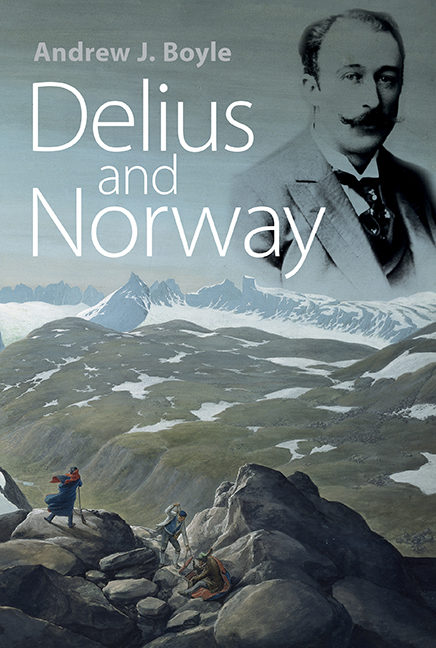Book contents
- Frontmatter
- Dedication
- Contents
- List of illustrations and tables
- Preface
- Abbreviations
- Selected glossary of landscape terms used in place names
- 1 Norway's awakening
- 2 1862–1888: Bradford, Florida and Leipzig
- 3 1888–1889: With Grieg on the heights
- 4 1890–1891: ‘C'est de la Norderie’
- 5 1892–1895: Norway lost
- 6 1896: Norway regained
- 7 1897: Front page news
- 8 1898–1902: Unshakeable self-belief
- 9 1903–1907: Breakthrough in Germany and England
- 10 1908–1912: Changes of direction
- 11 1912–1918: High hills, dark forests
- 12 1919–1934: Myth and reality in Lesjaskog
- Appendix I List of visits to Norway
- Appendix II Works with Norwegian and Danish texts and associations
- Selected bibliography and archival sources
- Index
2 - 1862–1888: Bradford, Florida and Leipzig
Published online by Cambridge University Press: 30 August 2017
- Frontmatter
- Dedication
- Contents
- List of illustrations and tables
- Preface
- Abbreviations
- Selected glossary of landscape terms used in place names
- 1 Norway's awakening
- 2 1862–1888: Bradford, Florida and Leipzig
- 3 1888–1889: With Grieg on the heights
- 4 1890–1891: ‘C'est de la Norderie’
- 5 1892–1895: Norway lost
- 6 1896: Norway regained
- 7 1897: Front page news
- 8 1898–1902: Unshakeable self-belief
- 9 1903–1907: Breakthrough in Germany and England
- 10 1908–1912: Changes of direction
- 11 1912–1918: High hills, dark forests
- 12 1919–1934: Myth and reality in Lesjaskog
- Appendix I List of visits to Norway
- Appendix II Works with Norwegian and Danish texts and associations
- Selected bibliography and archival sources
- Index
Summary
‘This English-American, musically deep, marvellous Hardangervidda Man’
Letter from Edvard Grieg to Frants Beyer, 20 February 1888Frederick Delius was born in Bradford in 1862.
Around 1800, Bradford was a rural market town deep in the rolling moorland landscape of western Yorkshire, and with a population of six thousand. Just a half century later, the industrial revolution had transformed the town beyond recognition. Industrialists wishing to invest in wool found there the conditions they sought: sandstone, an excellent building material; large deposits of iron ore and coal; and the soft water that was a prerequisite for scouring wool. By the middle of the century, Bradford was responsible for some two-thirds of Great Britain's wool production and was at the centre of much of the world's wool trade. A large part of the export trade was with Germany and inevitably many of the investors attracted by the town's industrial muscle were German – including Julius Delius. He moved from the textile centre of Bielefeld to Bradford c.1850, when he was twenty-eight years old. At that time the town's eighty textile factories gave work to a population that had risen to 180,000. Julius quickly expanded his export company, Delius & Co., Wool & Noil Merchants, and by 1871 could build new, modern warehouses and offices. He married Elise, also from Bielefeld, and together they had fourteen children. Child number four, the next eldest boy, was christened Fritz. (Only from 1902 would he adopt an English variant of the name, Frederick.)
The head of the family demanded an almost military discipline from his offspring. From an early age the sons were left in no doubt by Julius that they were expected to follow him into the family business. From the culture of his homeland, however, Julius also brought a deep love of music, and Delius recalled that his father ‘was a great concert-goer and he often had chamber music in the house’. The children were encouraged to play music: ‘I cannot remember the first time when I began to play the piano: it must have been very early in my life. […] When I was six or seven, I began taking violin lessons from Mr Bauerkeller of the Hallé Orchestra, who came over from Manchester especially to teach me.’
- Type
- Chapter
- Information
- Delius and Norway , pp. 15 - 38Publisher: Boydell & BrewerPrint publication year: 2017

